It’s been almost 10 years since the St. Louis Blues drafted goaltender Jake Allen as the 34th overall pick in the 2008 NHL Entry Draft. After years of scrutiny, a midseason rebirth and an amazing postseason Jake “the Snake” Allen has finally proven himself to the St. Louis fanbase.
Blues Beginnings
It was one of the worst times in franchise history. After the 2004 NHL lockout canceled season, the Blues would post the NHL’s worst record and fail to reach the postseason for the first time in 25 years. Questionable management decisions and unenthusiastic ownership led to an uninterested fan base and empty arenas. It wasn’t until Wal-Mart heir Nancy Walton-Laurie and her husband Bill sold the team in March 2006 that things would begin to change. New ownership immediately shook up the front office and the new regime began to revamp the roster. The Blues would go on to miss the playoffs for four straight seasons but in the process, they would begin to stockpile draft picks and promising young talent.
When the Blues drafted Allen in 2008, goaltending duties were being split by 35-year-old Manny Legace and 32-year-old Chris Mason. Even though young prospect Ben Bishop had made his first NHL appearance in the same season, drafting Allen made sense as the Blues desperately needed goaltending depth.
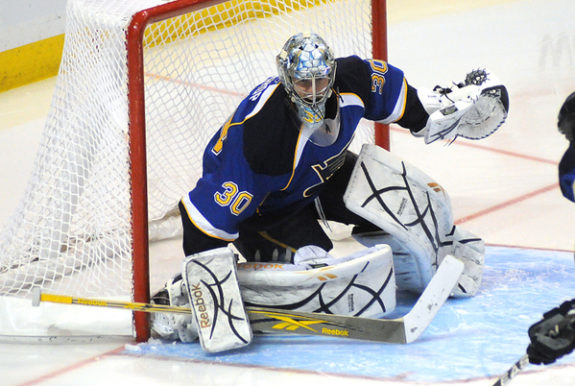
A less than promising goaltending core went through major changes following the 2009 season. Legace was released after being sent down to then American Hockey League affiliate Peoria, then in the summer of 2010 the Blues traded for Montreal Canadians playoff hero Jaroslav Halak. In July 2011 they signed eventual Blues’ fan favorite Brian Elliot to form the best goaltending duo of the 2011-12 season, winning the William M. Jennings Trophy. That postseason, Elliot would replace the injured Halak to lead the Blues to a series victory over the San Jose Sharks.
The success of Halak and Elliot allowed the Blues to trade Bishop for a second round pick in the 2013 NHL Draft. The trade made way for a young Allen who had been buying his time with Peoria, posting nine shutouts in the process. Allen played 15 games in the lockout-shortened 2012-13 season alongside Elliot after Halak went down with an injury. In the playoffs, the Blues went home early, as they were eliminated for the second straight season by the Los Angeles Kings but this time, in the first round.
Back to the AHL
After being called up to finish the 2012 season, Jake Allen began the 2013-14 season with the Blues AHL affiliate Chicago. The Blues would eclipse the 100-point mark for the sixth time in franchise history finishing third in the Western Conference. At the trade deadline, general manager Doug Armstrong may have pulled the trigger on the worst trade in franchise history (besides maybe the Mike Keenan debacle). The Blues traded Halak, forward Chris Stewart, and two 2015 draft picks to the Buffalo Sabres for goaltender Ryan Miller and then team captain Steve Ott. Armstrong made the move in hopes to sure up their goaltending to get over the hump in the postseason. The trade became a complete failure and the Blues went on to lose in the first round to the Chicago Blackhawks in the exact same way that they had lost to the Kings the year before, literally.
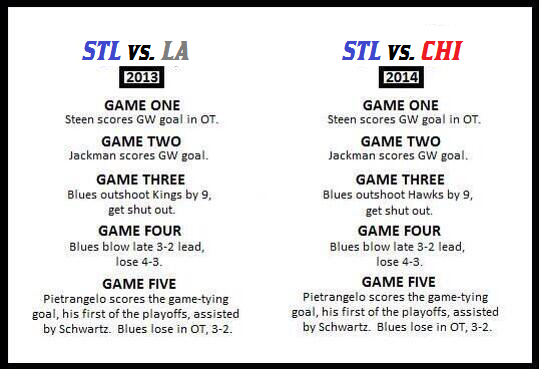
Meanwhile, Allen would unanimously win the Aldege “Baz” Bastien Memorial Award as the AHL’s outstanding goaltender for the 2013-14 season finishing the season with a 33-16-3 record, 2.03 goals-against average, a .928 save percentage, and a league-leading seven shutouts. Allen was phenomenal for the Wolves leading them to an AHL 2nd best 100 points and a second place western conference finish.
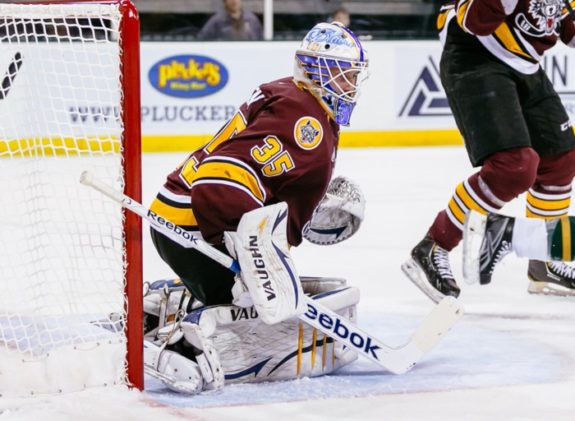
The Wolves would defeat the Rochester Americans in the first round of the Calder Cup Playoffs 3-2 in the best of five series and Allen would add another shutout to his stellar season in Game 4. However, Chicago’s great season would come to an end in the conference semifinals as they were swept by the Toronto Marlies 4-0.
The Final Call up
On May 19, 2014, the Blues decided they had seen all they needed to see with the aging Miller and announced that he would no longer be with the team after just 25 games in a blue and gold sweater. Subsequently, general manager Doug Armstrong re-signed Brian Elliot to a three-year, $7.5 million contract extension. Miller’s departure secured an NHL roster spot for Allen, and the call up would be his last.
Alongside Elliot, the young netminder played 37 games, posting an impressive 22-7-4 record, 2.28 goals against average, and a .913 save percentage. Behind stellar defense and goaltending the Blues allowed the fourth fewest goals in the NHL. Vladimir Tarasenko’s breakout 73-point season helped them score the fifth most goals and the Blues would win their second straight Central Division title.
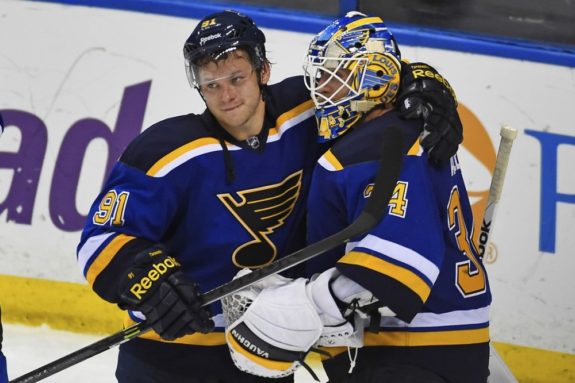
On November 25, 2014, Elliot injured his knee in a game against the Ottawa Senators. Without taking any chances headed toward the postseason the Blues would bring in arguably the greatest goaltender that has ever played in Martin Brodeur. The former New Jersey Devil signed a one-year contract worth $700,000. Brodeur played in seven games while filling in for Elliot, winning three. He was able to add another shutout to his resume, giving him an NHL record 125 in his 21-year career. After Elliot returned, Brodeur took a leave of absence and a few days later abruptly retired to join the Blues front office.
Allen would get his chance to shine as he would be named the starter for the first time in the postseason, but it was a familiar fate for the Blues. They would lose in six games to the Minnesota Wild in the first round.
An Amazing Season Spoiled
During the following offseason, the Blues traded away shootout specialist T.J. Oshie to the Washington Capitals for veteran Troy Brouwer, goaltender Pheonix Copley and a third-round draft pick in the 2016 NHL draft. The move left many scratching their heads, but similarly to this season’s Kevin Shattenkirk move, the Blues didn’t skip a beat.
Allen would play in 10 more games than the 2014 season and continued to look the part of the team’s goaltender of the future. Posting a record of 26-15-3, a solid 2.35 goals-against average, and a .920 save percentage. The Blues would finish 2nd in the Central and match up with division rival Chicago.
Heading into the postseason Blues fans were so happy with their goaltending that they had started comparing the duo of Allen and Elliot to the tandem of Jacques Plante and Glenn Hall, Hall of Famers that led the 1968-69 Blues to the Stanley Cup Finals.
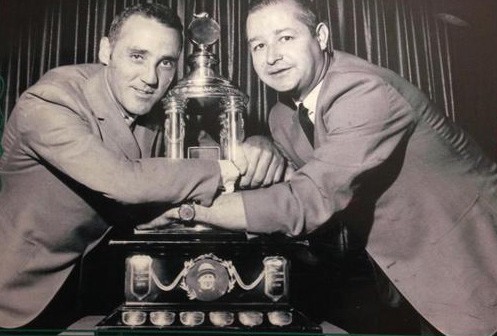
Behind Elliot, the Blues ended their first round struggles and defeated the Chicago Blackhawks in seven games. In the 2nd round, Allen would get his first postseason action in game 6. After three quick goals in the first period, Elliot was pulled in favor of Allen, who went on to stop all seven shots he faced in the remaining two periods. However, Elliot redeemed himself in a 6-1 Blues victory in Game 7.
St. Louis would make the conference finals for the first time in 15 seasons but failed to culminate one of their best seasons in franchise history. Head coach Ken Hitchcock decided to start Allen for Game 4 after a stinker from Elliot in Game 3. Allen allowed three goals but the Blues would get the 6-3 victory. Allen would get the nod in the following game and produce a stinker of his own giving up four goals in a reverse 6-3 loss. The Sharks defeated the Blues in six games to put an end to their season. Blues fans were tough on Hitchcock for yanking Elliot in the series, and some blamed the loss on the move.

Trading a Moose Solidifies Faith in a Snake
After the Western Conference Finals loss and Allen’s struggles in 2015 against Minnesota, the Blues’ fan base could only wonder if Allen was a guy who couldn’t perform when it mattered most. St. Louis had watched 49 years of hockey without a Stanley Cup and the latest scapegoat for many was Allen.
Blues brass proved that they didn’t feel the same about Allen. On June 24, 2016, St. Louis traded the man the fans call Moose to Calgary in exchange for the 35th overall pick in 2016 (became Jordan Kyrou) and a conditional third round pick in 2018. The move meant that it was now the Jake “The Snake” Allen show in St. Louis.
Salt was poured into the wound of a bitter fan base that lost two of their favorite players when they let team captain David Backes leave for Boston.
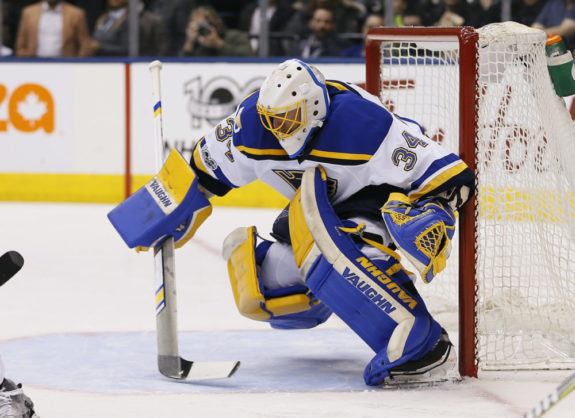
The Snake took the Blues on a roller coaster ride throughout the 2016 season. He started off the season with a 4-1-2 record, a .923 save percentage, and a 1.83 goals-against average, but as each month progressed Allen got worse. By December, he told the St. Louis Post-Dispatch he was “pretty pissed off” that his save percentage had dipped to .905, 25th in the NHL. On January 19, Allen allowed four goals on 10 shots against the Washington Capitals and was pulled not once in the game but twice. Allen was yanked four times in six outings. He was playing so poorly that the Blues decided to leave him home on their following road trip, starting career backup Carter Hutton.

The team continued to struggle and after losing five of six games to the tune of a underwhelming 24-21-5 record, the Blues fired Hitchcock and propelled his hand-picked successor Mike Yeo into the head coaching position, a move that would save the Blues season and quite possibly Allen’s career.
Enter Marty Brodeur
Not only did the Blues fire Hitchcock, they also sent goalie coach Jim Corsi packing. The man that smoothed things over for the Blues to end the 2014-15 season would be called upon again to do the same in 2016. Brodeur was given full control of the goaltending schedule and began to work one on one with Allen.
Brodeur noticed that Allen’s biggest issues were basic fundamentals. Things like keeping the puck in the center of the chest, motion in his skating during a rush, and keeping himself square to the puck.
Allen’s season immediately rebounded and a month later Allen carried a .941 save percentage and a 1.80 goals against average, the best in the NHL over that span.
The Blues won seven of their first eight games under Yeo, the best of any Blues’ coach debut in franchise history. They went from 28th to first in goals against per game and finished with a 21-8-2 record, and finished as one of the hottest teams in the NHL going 7-1-2 in their final 10 games.
The Snake Proves he can Perform Under Pressure
Undoubtedly, the biggest storyline of the first round was Allen’s amazing play. His 51 saves in Game 1 led the Blues to an overtime win and by the end of Game 3 Allen had saved 114 of 117 shots in the series. The Blues would advance in five games and Allen silenced any of the remaining doubters proving he could lead a team to a postseason series victory.
The Blues would run into a golden buzzsaw in the name of the Nashville Predators in the second round. Allen continued his stellar play but the goaltender on the other end of the ice, Pekka Rinne was just as good. Penalties would prove to be St. Louis’ kryptonite in the series and the drama-filled 2016-17 season would come to an end.
A Bright Future
As frustrating as another early postseason departure is for the Blues, the future looks bright. They now have a solidified, proven number one goaltender that has the capability to carry a team through a postseason series. You have to look at the adversity that Allen overcame this season and how he was able to not only return to form but regain confidence in himself. Allen and the Blues do owe a lot to Brodeur but at the end of the day it was not the four-time Vezina winner making the saves, it was Allen.
The Blues will have a full offseason with Yeo at the helm, they have promising young talent in the farm system and guys like Robbi Fabbri, Ivan Barbashev, Zach Sanford and Joel Edmundson will have another year under their belt. There is a chance backup goaltender Carter Hutton is chosen in the NHL expansion draft but every other major piece of the Blues puzzle is safe going forward.
Allen has finally proven himself to the St. Louis fanbase. Every goaltending transaction that has taken place in the last 10 years (besides Miller) is now reinforced as the correct moves. Not Bishop, not Halak, not Elliot, but Jake “The Snake” Allen could be the goaltender the Blues need to give the city of St. Louis a Stanley Cup championship.